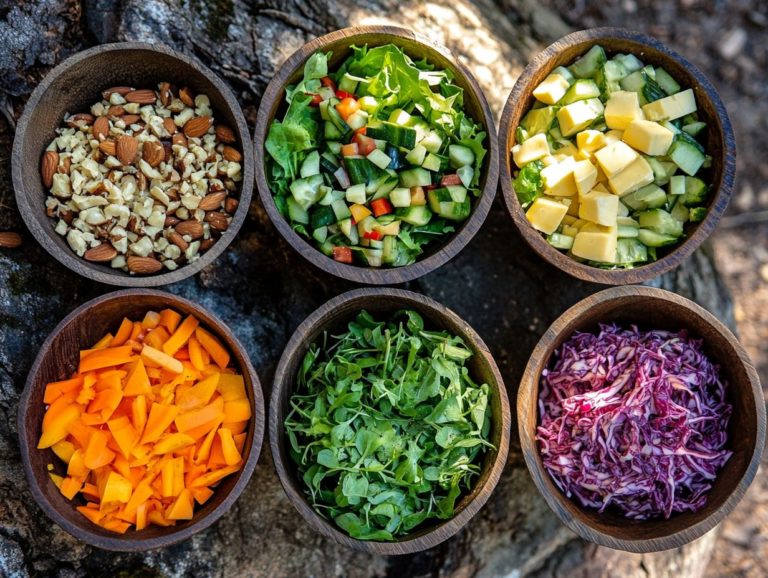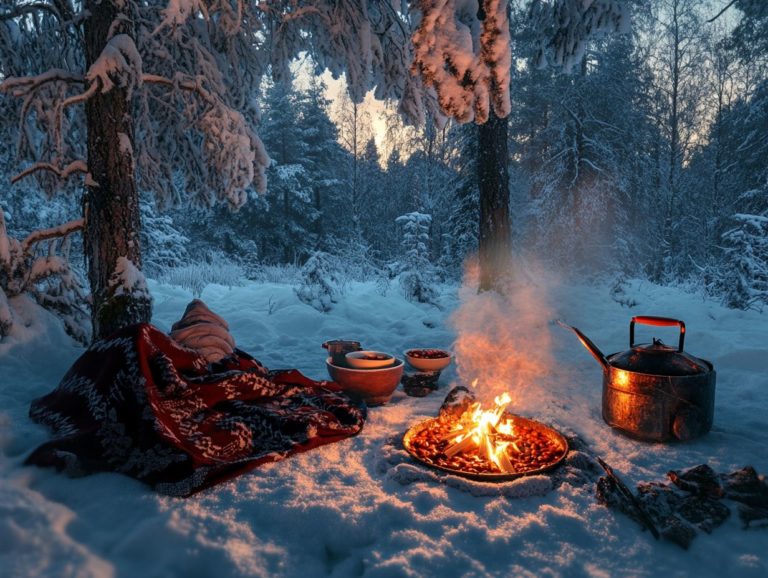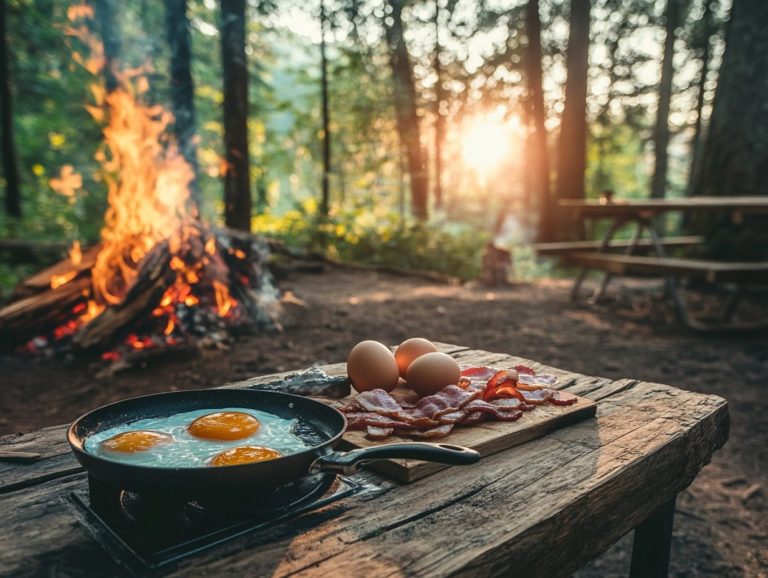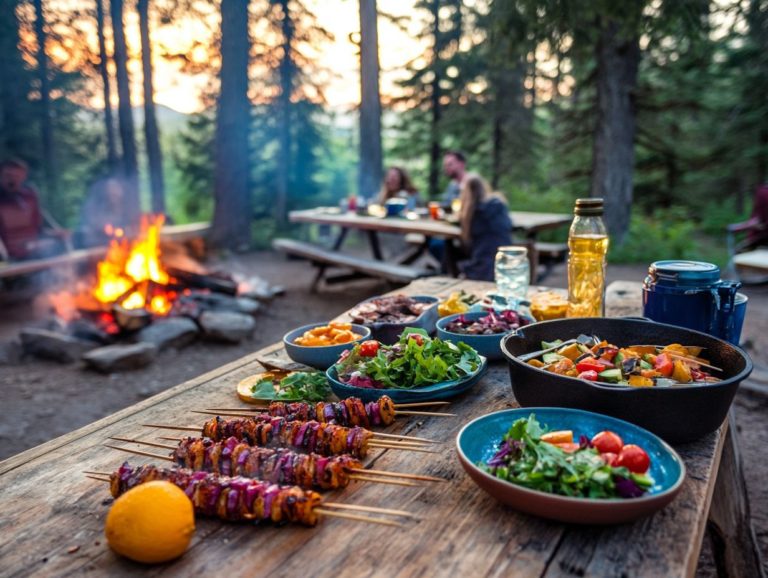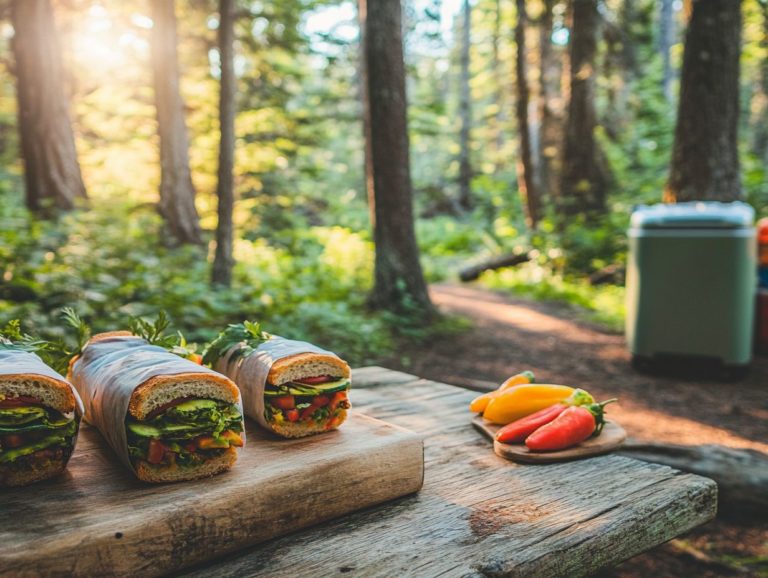5 Essential Ingredients for Camping Cooking
When it comes to cooking while camping, preparation is your secret weapon. You want to relish delicious meals without the stress, and having the right gear can truly transform your experience.
This article dives into five essential items every camping chef should possess:
- A portable stove
- Essential cooking utensils
- A cooler to keep your ingredients fresh
- A reliable fire starter
- Nutritious non-perishable foods and staples
You will also find tips for selecting the best equipment and ingredients to craft an unforgettable outdoor culinary adventure. Get excited to elevate your camping meals and fully savor the wonders of the great outdoors!
Contents
- Key Takeaways:
- 1. Portable Stove
- 2. Cooking Utensils
- 3. Cooler or Ice Chest
- 4. Fire Starter
- 5. Non-Perishable Foods
- What Are the Different Types of Portable Stoves for Camping?
- Frequently Asked Questions
- What are the 5 essential ingredients for camping cooking?
- Do I need to bring all 5 ingredients for every camping meal?
- Why is protein important for camping cooking?
- Can I substitute fresh vegetables with canned vegetables?
- What kind of seasonings should I bring for camping cooking?
- Do I need to bring a lot of oil or butter for camping cooking?
Key Takeaways:
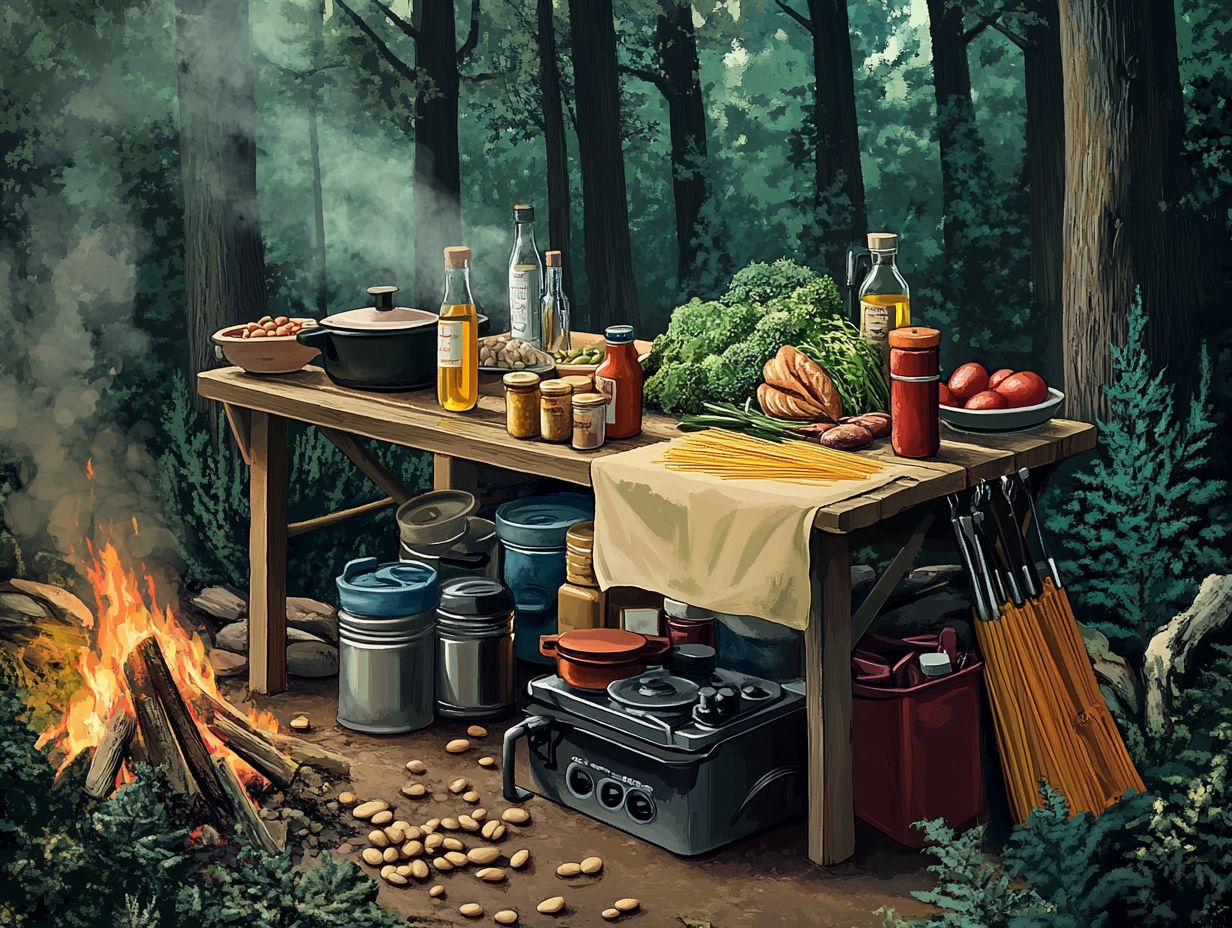
- A portable stove is a must-have for camping cooking, providing a convenient and efficient way to cook meals while in the great outdoors.
- Essential cooking utensils such as a pot, pan, and utensils can make meal preparation easier and more enjoyable while camping.
- Keeping food fresh without refrigeration can be done with the use of a cooler or ice chest, allowing for perishable items to be stored and consumed during the camping trip.
1. Portable Stove
A portable stove is an essential piece of camping gear that allows you to whip up delicious meals while immersing yourself in the beauty of the backcountry. Whether you re savoring breakfast, lunch, or dinner in stunning locales like Baja or Bahia Concepci n, the right portable stove can elevate your outdoor cooking experience.
Using ingredients like Rice Bran Oil or seasoning such as Chile Powder can enhance your dishes. When you’re focused on packing lightweight equipment that doesn’t skimp on functionality, it makes all the difference.
Understanding how to properly use and maintain your stove is crucial for ensuring both safety and efficiency during your camping adventures, especially when preparing fresh vegetables and produce.
When choosing a suitable portable stove, consider the various fuel types available, such as propane, butane, or different types of fuels each with its own set of benefits. Propane stoves, for example, are user-friendly and ignite quickly, making them a favored choice for short camping trips. On the other hand, multi-fuel stoves offer flexibility for those longer excursions into remote areas.
Lightweight models are easy to carry in your backpack, ensuring ease of transport. Brands like MSR are renowned for their reliability and performance, making them excellent choices when selecting your ideal stove.
Always prioritize safety by using your stove in well-ventilated areas, and stick to regular maintenance practices like cleaning and checking for gas leaks. This way, you can enjoy a hassle-free cooking experience in the great outdoors.
2. Cooking Utensils
When you venture into the great outdoors, having the right cooking utensils is essential for preparing meals efficiently and safely. This ensures you can effortlessly whip up everything from breakfast to dinner, and for those looking for easy options, check out these no-cook meals perfect for camping trips without any hassle.
To elevate your outdoor cooking experience, pay attention to the materials of these essential utensils. Choosing stainless steel or titanium tools offers durability without the burden of unnecessary weight in your pack.
A reliable non-stick pan will make frying eggs or sautéing veggies a breeze, while a sturdy cutting board protects both your ingredients and the campsite from damage. For those looking to elevate their outdoor cooking experience, having the right tools is key. Consider exploring essential gear for cooking over a campfire, and incorporating trail mix and bacon can also enhance your meals.
Investing in hard-sided, reusable containers can truly transform your camping experience. These containers not only keep your food organized but also minimize waste, making them a sustainable choice that enhances your adventures in the wild.
Share your favorite camping cooking experiences or tips in the comments below!
3. Cooler or Ice Chest
A high-quality cooler or ice chest is essential for maintaining food safety during your camping trips. It allows you to store fresh ingredients like vegetables and produce without sacrificing quality.
This important camping tool not only extends the lifespan of your food but also opens the door to delightful meals, from hearty breakfasts to refreshing lunches.
When you invest in an efficient cooler that retains ice effectively and meets your packing needs, you elevate your cooking experience in the great outdoors. Enjoy meals that include fresh produce and seasoning.
When selecting the perfect cooler, pay attention to key features such as better insulation, which keeps your perishables fresh for longer. The right size should strike a balance between portability and capacity, offering ample storage without being cumbersome.
Durability is equally important; the demands of outdoor adventures can quickly wear down lesser-quality options. To maximize efficiency, pack strategically by placing heavier items at the bottom and using smaller reusable containers or bags for better organization.
Pre-chilling the cooler before packing helps maintain cooler temperatures for a longer duration, ensuring your adventure is filled with delicious, fresh meals every step of the way.
4. Fire Starter
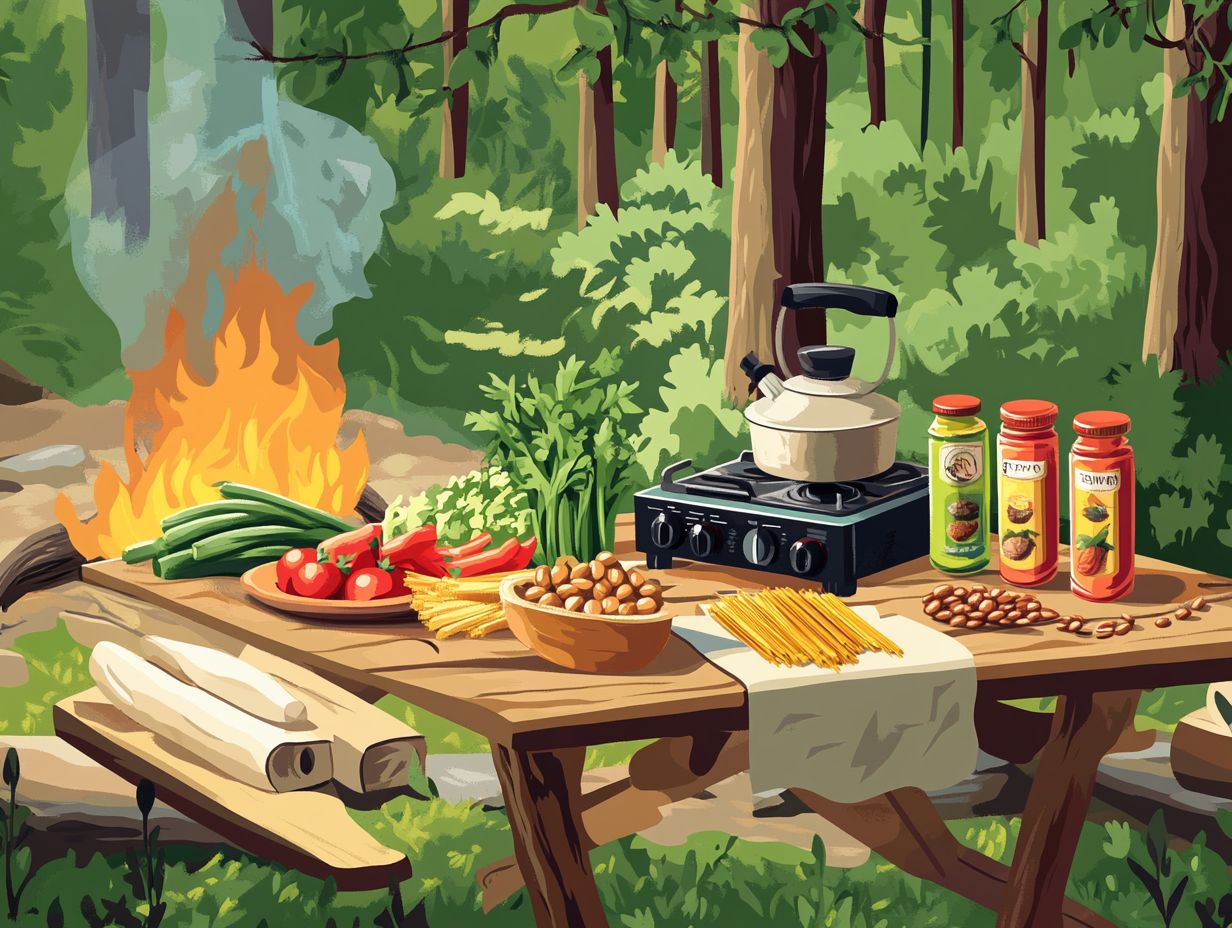
A reliable fire starter is an essential companion for your camping trips. It ensures you can swiftly and safely ignite a fire for cooking, warmth, or simply setting the mood during your outdoor adventures.
With a range of options at your disposal from traditional matches to modern fire starters understanding how they work and their safety measures is vital for a successful experience in the wild.
Exploring alternative fire starters can elevate your skills, enabling you to adapt to various environmental conditions while enjoying nature s splendor, especially when preparing to cook over an open fire.
These fire starters can include handy lighters, magnesium sticks (which create sparks to ignite a fire), and more unconventional methods like flint and steel or even creative solutions like dryer lint and wax. Each type offers unique advantages: while traditional matches are incredibly portable, alternative options often shine in damp conditions where reliability is essential.
When selecting your fire starter, consider the specific context of your trip. Windy locations might call for windproof lighters, while wet environments could necessitate waterproof matches. Don t leave your fire starter behind your outdoor fun depends on it! Always keep safety in mind ensure your campsite is free from flammable materials and practice responsible fire usage to safeguard both your surroundings and fellow campers.
5. Non-Perishable Foods
Stocking up on non-perishable foods is a game changer for your camping trips! These meal staples ensure you have nourishing options that withstand the test of time and don t require refrigeration.
When planning your outdoor meals, think about incorporating items like quinoa, dried beans, or whole grain pasta. These not only offer sustenance but also versatility. For example, quinoa is high in protein and cooks quickly, making it an ideal base for lunch salads or warm bowls.
Packing these essentials in airtight containers will save space and protect them from moisture. Start your day with a warm bowl of oatmeal topped with dried fruits, giving you the energy you need for outdoor adventures.
Then, picture settling in for a hearty bean chili dinner, providing warmth and comfort beneath the stars. By combining these hearty ingredients, you can craft meals that are as satisfying as they are simple to prepare.
Ensure your camping experience remains enjoyable and hassle-free. Get your non-perishable foods ready for a hassle-free camping adventure!
What Are the Different Types of Portable Stoves for Camping?
When it comes to camping, understanding the various types of portable stoves is essential. This knowledge helps you select the right equipment for your outdoor cooking needs, ensuring both convenience and efficiency.
The right stove can elevate your camping adventures. Canister stoves are user-friendly and great for quickly preparing meals. However, they may not perform well in extreme temperatures.
Liquid fuel stoves offer versatility, allowing you to cook a wide array of dishes even in challenging conditions. They do require more maintenance and fuel management.
If you prefer an eco-friendly option, wood-burning stoves utilize natural resources. Keep in mind that they require extra effort for fuel collection.
To make an informed choice, think about your cooking style, the duration of your trip, and the availability of different fuel types nearby. For more guidance, check out these tips for choosing a safe campground for cooking. This thoughtful approach ensures your camping meals are as delightful as the great outdoors.
What Are the Must-Have Cooking Utensils for Camping?
When planning your camping trip, having the essential cooking utensils can enhance your outdoor cooking experience. The right tools, including essentials of campfire cooking gear, make it easy to whip up a variety of meals. Consider spatulas, knives, spoons, and reusable containers to keep your ingredients organized and accessible.
Choose durable and lightweight options to maximize your packing efficiency while ensuring safety as you prepare delicious meals outdoors.
Investing in sturdy pots and lightweight pans helps elevate your cooking. Reusable containers made from safe materials keep your ingredients fresh and reflect an environmentally conscious mindset.
As you pack, use stackable designs to save space and keep your gear tidy. Use labels to quickly identify your ingredients and meals, streamlining meal prep.
By prioritizing practicality, you can turn meal preparation into a delightful outdoor adventure, transforming every campsite into a mini-kitchen filled with potential. Try out unique camping recipes to impress your friends.
How Can One Keep Food Fresh Without Refrigeration While Camping?
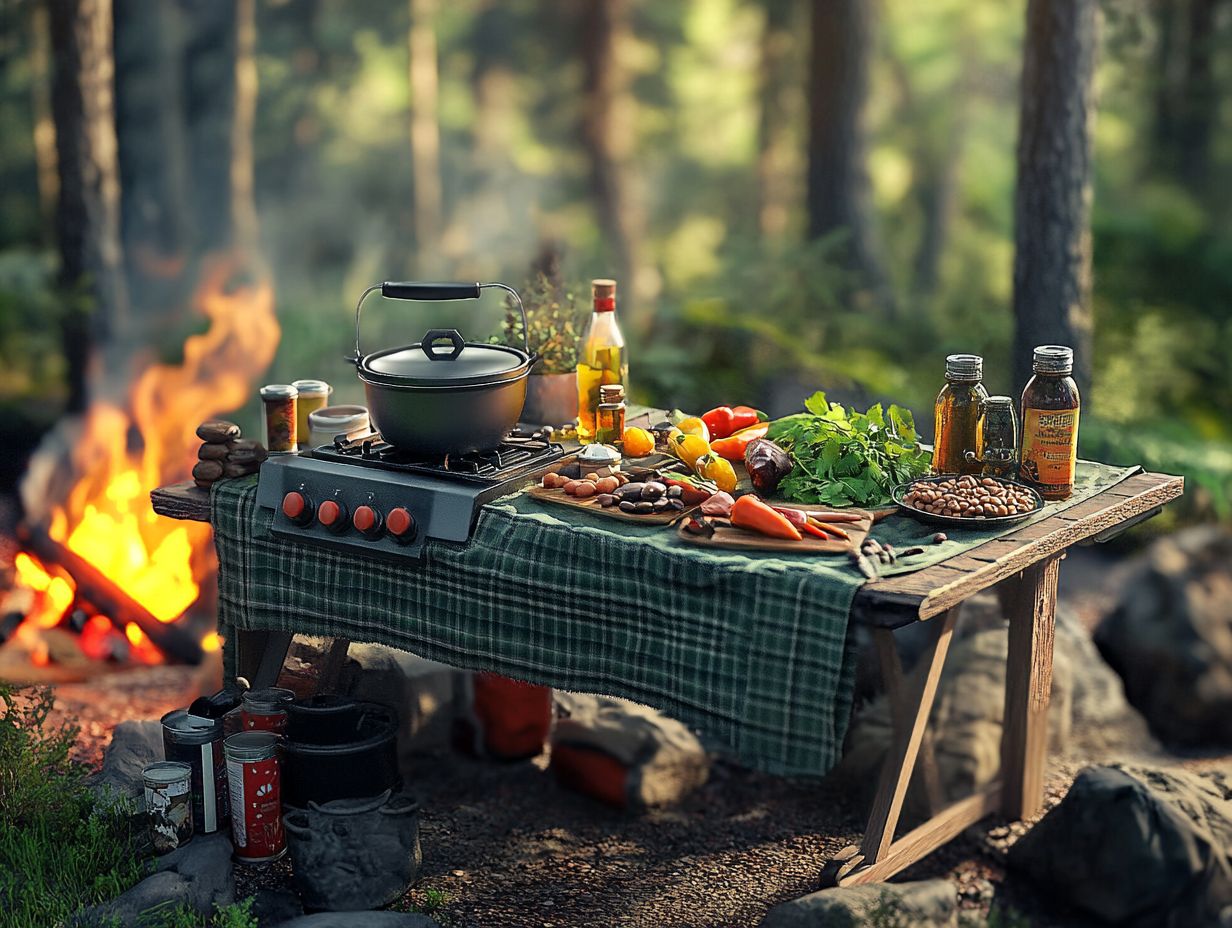
Keeping food fresh without refrigeration while camping can be challenging. However, with the right techniques and tools, you can ensure food safety and enjoy fresh meals on your outdoor adventures. Use coolers, ice packs, and non-perishable ingredients to extend your food’s shelf life, allowing you to savor delightful meals.
Understanding the principles of food storage, such as temperature control and ingredient selection, is crucial for a successful camping experience, especially when you have the right essential gear for family camping meals.
When choosing a cooler, select one with thick insulation and secure seals to maintain consistent temperature. Place ice packs strategically to fill empty spaces, minimizing warm air circulation.
For non-perishable foods, opt for nutrient-rich and versatile choices like canned vegetables, dried fruits, and whole grains. Organize these foods by type to save time and streamline meal prep.
Prioritizing food safety limits the risk of spoilage or contamination, keeping your camping experience enjoyable and worry-free.
What Are Some Alternative Fire Starters for Camping?
Discover alternative fire starters for camping! They help you ignite fires quickly and safely, no matter the conditions.
From waterproof matches to fire starter blocks, these options bring reliability and ease of use to your camping toolkit, making them critical for any outdoor adventure.
Understanding the benefits and limitations of each fire starter can elevate your outdoor experience. This ensures you’re prepared for whatever challenges come your way.
By keeping a variety of options in your gear, you can easily adapt to different fire-starting scenarios. Whether you re dealing with damp wood or unpredictable weather, you ll be ready.
For example, using dryer lint as a lightweight starter can be surprisingly effective when paired with kindling. Magnesium strips shine for their ability to produce intense sparks, even in tough conditions.
Each method has its own technique and care requirements. Familiarizing yourself with their usage is essential.
For maximum safety, consider storing these starters in waterproof bags. This way, you’ll have access to them even in damp situations.
You’re guaranteed a successful ignition when you need it most!
What Are Some Easy and Nutritious Non-Perishable Foods for Camping?
Choosing easy and nutritious non-perishable foods is crucial for maintaining your energy and health while enjoying the great outdoors.
You’ll want satisfying meals without the hassle of refrigeration. Staples like canned beans, dried fruits, and instant oatmeal offer convenience and versatility.
By opting for healthy choices, you can enjoy a balanced diet even in remote locations.
Consider incorporating quinoa and whole grain pasta as hearty bases for various dishes. They provide plenty of protein and fiber.
Pack some nut butter it’s perfect for a protein-packed snack or a delightful addition to desserts.
Canned vegetables can help round out your meals. They enhance nutrition without sacrificing convenience.
Picture this: a breakfast of oatmeal topped with dried fruits and nuts to jumpstart your day.
For lunch, enjoy whole grain pasta tossed with canned beans and a drizzle of olive oil. As evening descends, treat yourself to a comforting bean chili made with canned tomatoes and spices.
This variety keeps your meals exciting and enhances your overall camping experience.
Frequently Asked Questions
What are the 5 essential ingredients for camping cooking?
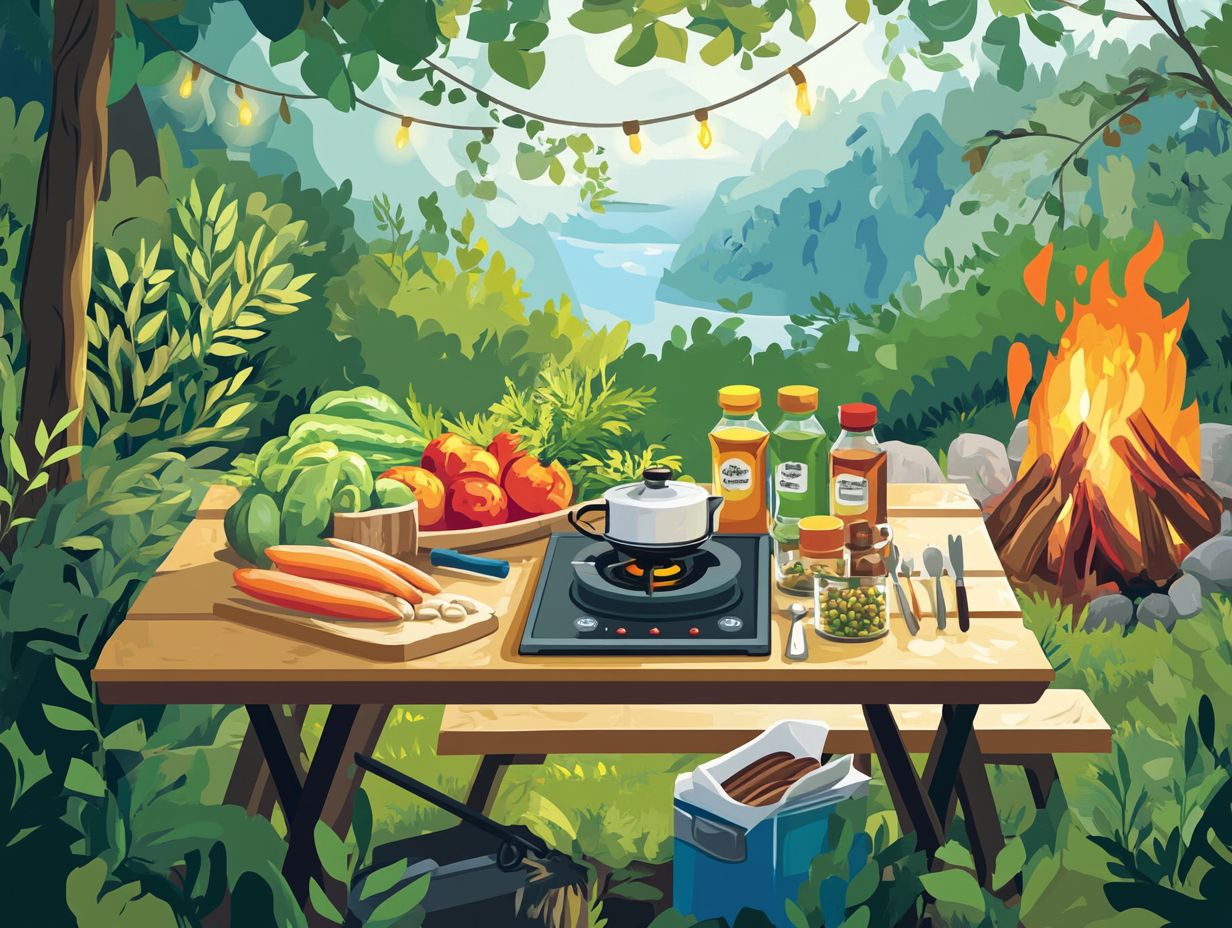
The 5 essential ingredients for camping cooking are protein (like meat or beans), grains (such as rice or quinoa), vegetables, seasonings, and oil or butter for cooking. To enhance your outdoor cooking experience, consider these 5 essential tips for cooking on a campfire.
Do I need to bring all 5 ingredients for every camping meal?
No, you can mix and match the ingredients to create different meals. For example, use the protein, grains, and vegetables to make a stir-fry or a hearty soup.
Why is protein important for camping cooking?
Protein is vital for camping cooking because it provides essential nutrients and energy for outdoor activities. It also helps keep you full during long hikes or other adventures.
Can I substitute fresh vegetables with canned vegetables?
Yes, you can substitute fresh vegetables with canned ones. Canned vegetables are convenient and have a longer shelf life, making them ideal for outdoor cooking.
What kind of seasonings should I bring for camping cooking?
Essential seasonings for camping cooking include salt, pepper, garlic powder, and dried herbs like oregano and thyme. To enhance your campfire meals, it’s also helpful to know what the essentials for campfire cooking are, as these add flavor without taking up too much space in your camping gear.
Do I need to bring a lot of oil or butter for camping cooking?
No, a small amount of oil or butter goes a long way. You can use them to cook meat or vegetables or grease your cooking utensils. Just pack them properly to avoid spills.

